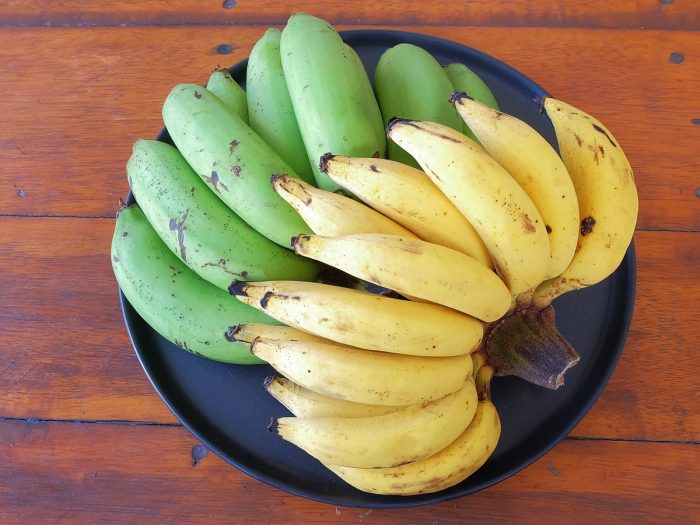The choice between a ripe banana and an unripe banana seems like an obvious one for some people, but there are advantages and disadvantages to both, depending on your health goals.
Eating Ripe Bananas – Benefits & Drawbacks
While most people choose to eat ripe bananas, it is important to understand both the good and the bad aspects of this fruit.
Benefits
The process of ripening for a banana consists of the resistant starch in the fruit converting to a more easily digestible fiber, called pectin. A ripe banana also possesses more sugar, which will make them taste sweeter. Ripe bananas tend to be digested faster, and may also provide more antioxidants than at their unripe stage. [1]

Ripe vs unripe bananas Photo Credit: Shutterstock
Serving Size : Nutrient Value Water [g] 74.91 Energy 89 Energy [kJ] 371 Protein [g] 1.09 Total lipid (fat) [g] 0.33 Ash [g] 0.82 Carbohydrate, by difference [g] 22.84 Fiber, total dietary [g] 2.6 Sugars, total including NLEA [g] 12.23 Sucrose [g] 2.39 Glucose (dextrose) [g] 4.98 Fructose [g] 4.85 Maltose [g] 0.01 Starch [g] 5.38 Calcium, Ca [mg] 5 Iron, Fe [mg] 0.26 Magnesium, Mg [mg] 27 Phosphorus, P [mg] 22 Potassium, K [mg] 358 Sodium, Na [mg] 1 Zinc, Zn [mg] 0.15 Copper, Cu [mg] 0.08 Manganese, Mn [mg] 0.27 Selenium, Se [µg] 1 Fluoride, F [µg] 2.2 Vitamin C, total ascorbic acid [mg] 8.7 Thiamin [mg] 0.03 Riboflavin [mg] 0.07 Niacin [mg] 0.67 Pantothenic acid [mg] 0.33 Vitamin B-6 [mg] 0.37 Folate, total [µg] 20 Folate, food [µg] 20 Folate, DFE [µg] 20 Choline, total [mg] 9.8 Betaine [mg] 0.1 Vitamin A, RAE [µg] 3 Carotene, beta [µg] 26 Carotene, alpha [µg] 25 Vitamin A, IU [IU] 64 Lutein + zeaxanthin [µg] 22 Vitamin E (alpha-tocopherol) [mg] 0.1 Tocopherol, gamma [mg] 0.02 Tocopherol, delta [mg] 0.01 Tocotrienol, alpha [mg] 0.06 Vitamin K (phylloquinone) [µg] 0.5 Fatty acids, total saturated [g] 0.11 10:0 [g] 0 12:0 [g] 0 14:0 [g] 0 16:0 [g] 0.1 18:0 [g] 0.01 Fatty acids, total monounsaturated [g] 0.03 16:1 [g] 0.01 18:1 [g] 0.02 Fatty acids, total polyunsaturated [g] 0.07 18:2 [g] 0.05 18:3 [g] 0.03 Phytosterols [mg] 16 Tryptophan [g] 0.01 Threonine [g] 0.03 Isoleucine [g] 0.03 Leucine [g] 0.07 Lysine [g] 0.05 Methionine [g] 0.01 Cystine [g] 0.01 Phenylalanine [g] 0.05 Tyrosine [g] 0.01 Valine [g] 0.05 Arginine [g] 0.05 Histidine [g] 0.08 Alanine [g] 0.04 Aspartic acid [g] 0.12 Glutamic acid [g] 0.15 Glycine [g] 0.04 Proline [g] 0.03 Serine [g] 0.04 Sources include : USDA [2]
Drawbacks
The bad thing about ripe bananas is that they can be dangerous for diabetics and those who are watching their blood sugar. The high sugar content can cause spikes and drops in blood sugar that diabetics want to avoid. Furthermore, the ripening process reduces the concentration of certain key minerals and vitamins in the banana. [3]
Eating Unripe Bananas – Benefits & Drawbacks
Similarly, eating an unripe banana may not be a popular choice, but there are some potential benefits that may surprise you.
Benefits
While eating a more starchy banana may not taste as delicious, and could be lacking that creamy texture you expect from a banana, that starch also takes longer to digest. This means that unripe bananas can make you feel full for longer periods of time, preventing over-eating and snacking between meals. The starch will also stimulate your metabolism, thus leading to more fat-burning activity in the body. [4]
Drawbacks
Eating an unripe banana is rarely pleasant, as the flavor can be bitter and the texture is almost waxy or chalky, at times. Some of the active ingredients in unripe bananas can also inhibit enzyme production in the body, making it more difficult for your body to digest complex carbohydrates, causing you to miss out on some of the potential nutrients in the fruit. [5]
Ripe vs Unripe Bananas – Conclusion
In the timeless battle between choosing a ripe or unripe banana, it is difficult to choose the “best” option. Either variety of banana can offer certain health benefits, depending on what your health goals happen to be. The only clear choice between ripe and unripe bananas is for diabetic patients, who should limit or closely regulate their intake of sugar-rich ripe bananas.
